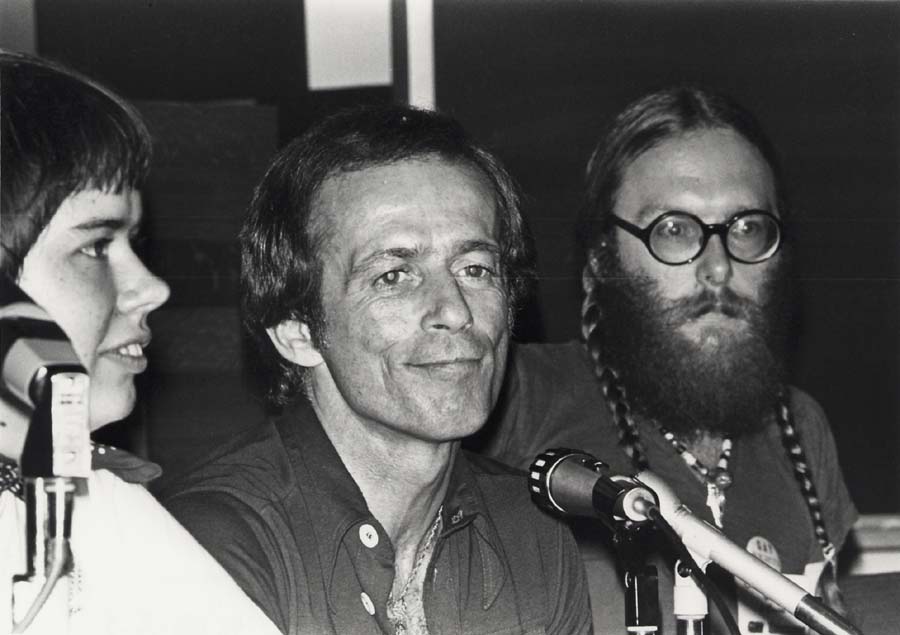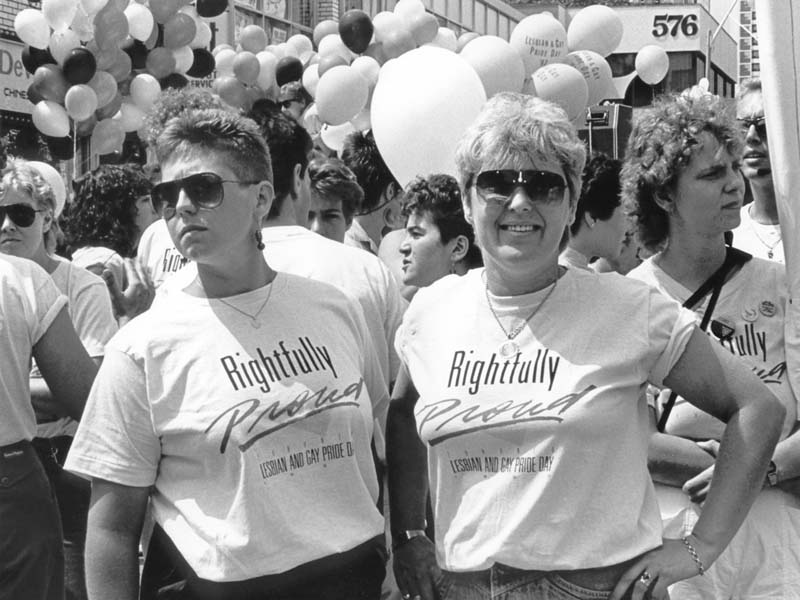|
In January 1975, the Coalition for Gay Rights in Ontario (CGRO) was founded. CGRO was made up of gay liberation groups from across the province and established to co-ordinate a province-wide campaign to include sexual orientation in the Ontario Human Rights Code. The campaign included briefs, rallies, demonstrations and educational pamphlets. John Damien and the CGRO Human Rights Amendment Campaign Shortly after its founding, CGRO got their first test case; John Damien was fired by the Racing Commission because he was gay. Damien had twenty years experience in thoroughbred racing including five years as racing steward, an official of the Ontario Jockey Club. CGRO and GATE launched the Committee to Defend John Damien in February 1975. The first chair of the Committee was Chris Bearchell, who came into gay liberation politics with experience from the pro-choice movement and in particular with experience in the defense campaign for Dr. Henry Morgentaler. In September 1976, the 2nd annual meeting of the National Gay Rights Coalition, the largest march for lesbian and gay human rights to date converged on City Hall in Toronto calling for reinstatement of John Damien and inclusion of sexual orientation in human rights legislation (see photos: 1976, NGRC, Toronto).  From left to right: Chris Bearchell. John Danien, Charlie Hill speaking at the founding conference of the National Coalition for Gay Rights, Ottawa, 1975. Photo Credit: The Ottawa Journal, City of Ottawa Archives. The National Gay Rights Coalition and the Federal Bill of Rights Shortly after the founding conference of the National Gay Rights Coalition in July 1975 and the launching of their campaign to get Human Rights protection in the Federal Bill of Rights, Barbara Thornborrow walked into the office of Gays of Ottawa, with a story of being dismissed from the Canadian armed forces because she was a lesbian. At the time, the justice committee was reviewing the Canadian Human Rights Act, but refused to accept a submission from Barbara Thornborrow. The Canadian Human Rights Act, which created the Canadian Human Rights Commission, was finally passed on June 2, 1977, by the Federal Parliament; but homosexuals were not included. The Damien case and Barbara Thornborrow's fight against a discriminatory dismissal from the armed forces gained national attention and fuelled the campaign for human rights protection on the basis of sexual orientation. On May 21st 1977, CGRO presented it's first brief to the Ontario Human Rights Commission: The Homosexual Minority in Ontario. The brief documented incidences of discrimination in jobs and housing, citing the cases of John Damien and Barbara Thornborrow and others -- and set out a series of demands for lesbian and gay rights including the first demands for custody rights for gay parents. On June 29th, 1977 a Gallup Poll showed that 52 percent of Canadians believed gay people should be protected against discrimination under the new Canadian Human Rights Act. And on July 21st, 1977 the Ontario Human Rights Code Review Committee released Life Together, a Report of the Ontario Human Rights Commission to the Ontario Government, calling for major changes to the code including strong support for protection on the basis of sexual orientation. "Homosexual men and women live and work, for the most part, quite inconspicuously in our society. Their sexual orientation is unknown to many people and considered irrelevant to others who are aware. However, there have been a number of situations recently… where persons have been fired from, or demoted in their jobs when their employers learned that they were homosexual. The competency of the people being fired, or demoted, has not been questioned by their employers. The action has been taken only on the basis of a value judgement of their lifestyle." The Life Together Report concluded that: "There can be no doubt that homosexual men and women suffer from frequent and extensive discrimination because of their sexual orientation… individuals have been fired or denied accommodation, or have in many other ways suffered indignities simply because they are homosexuals. This is deplorable in a society which claims, as its public policy, that "every person is free and equal in dignity and rights." Life Together, a Report of the Ontario Human Rights Commission to the Ontario Government. In March 1978, CGRO's second brief, Discrimination and the Gay Minority, was presented at a Queen's Park press conference and distributed to members of the Ontario Legislature. The CGRO brief began by quoting from the Life Together Report: "Homosexuals have never received the same protection from discrimination that is extended to their fellow citizens under the sex provisions of the Ontario Human Rights Code. As a result, they are subject to blackmail, to arbitrary dismissal from their jobs, and to summary eviction." Life Together, page 9 Report of the Ontario Human Rights Commission to the Ontario Government, July 1977. THE HUMAN RIGHTS OMISSION In April 1981, CGRO's third brief, The Ontario Human Rights Omission, is published and presented to MPPs. The brief continues to detail incidents of discrimination in housing and jobs, but includes a new section on police brutality and homophobia. It also documents a growing number of incidences of gay bashing in the wake of the bath raids. The ongoing denial of human rights protection, combined with the increasing visibility of individual gays and lesbians led to an increase in incidents of gay bashing. On December 1st the Ontario Legislature debates and defeats an amendment to include sexual orientation in the Human Rights Code. Non-violent protesters; the Reverend Brent Hawkes, Del Mansel and Paul Murphy handcuffed themselves to the railings in the spectators' gallery. Chris Bearchell reported for The Body Politic in an article entitled "Ontario finally says no". After a decade of campaigns for human rights protection the defeat of the bill in 1981 amidst a growing backlash, police raids and internationally, the assassination of Harvey Milk in San Francisco, resulted in a sense of the end of the road for the human rights strategy. OUR TIME HAS COME By 1986 however, the context had changed; years of organizing had resulted in growth of the gay and lesbian movement. There was greater diversity of the community with the emergence of Gay Asians, Zami and Lesbians of Colour. In 1982, Gay Asians led the Pride Day march through Chinatown in Toronto. As well, there was a change of government in Ontario. A minority liberal government in accord with the NDP came into power bringing to an end the 40 year long rule of the provincial Conservatives. Federally, the Charter came into effect on April 17, 1983. And despite the absence of specific protection in the Charter, it would have significant impact on gay rights efforts… this combined with a new Liberal/ NDP accord opened the possibility for a human rights amendment once again. Throughout all of this, John Damien had continued his case against the provincial government, encountering stonewalling, deception and obstruction. Damien was blacklisted from racing, was unable to find employment and was ruined financially. The case increasingly took its toll on John leading to the deterioration his health. In 1986, the Ontario Government began a review of the Ontario Human Rights legislation to bring it into compliance with the Charter. Gay rights activists organized for an amendment to the bill (Bill 7) to include protection on the grounds of sexual orientation. CGRO and the Right to Privacy Committee launched an intensive lobby campaign of MPPs to urge passage of the sexual orientation amendment. Chris Bearchell toured the province meeting with provincial CGRO groups to document incidents of discrimination for a new CGRO brief and to build the campaign to support the amendment and passage of Bill 7 in small communities across the province. In October 1986 CGRO produced the final version of fourth brief to the Ontario Legislature, Discrimination Against Lesbians & Gay Men: the Ontario Human Rights Omission. Right-wing organizations, fundamentalist churches and the Roman Catholic bishops organized against the bill. Between September and December 1986 and during the debate on Bill 7, there was a storm of protest by churches, the Catholic Bishops, Christian and fundamentalist religious organizations opposing the bill. The debate in the Ontario legislature consumed seven legislative days as the Tories attempted a filibuster. MPPs read into the record extreme anti-gay discriminatory views as justification for exclusion from human rights protection for lesbians, gays and bisexuals. They argued against human rights protection for gays and lesbians on the basis of: a defense of social values…the need to protect the foundation of the traditional family…the expectation that giving such rights will lead to recognition of gay relationships and even gay marriage…that these protections would mean that schools would be forced to hire gays who could harass children…that parents would be forced to have gay teachers…that the Bible condemns homosexuality…and, that homosexuality is unnatural, perverse, even criminal. After seven days of heated debate, and 15 years of campaigning by the lesbian and gay liberation movement… on December 2nd, 1986, the Ontario legislature passed the amendment to include sexual orientation in the Ontario Human Rights Code by a vote of 64 to 45, making Ontario the second province after Quebec, to pass human rights protection for lesbians and gay men. (See: Our Time has come.)
In 1987, CGRO and RTPC led the Pride Day march in Toronto as the honoured groups for their roles in gaining human rights for gays, lesbians and bisexuals. John Damien lived to hear of the passage of Bill 7 and the press interviewed him on his response. Three weeks later on Christmas Eve, he died of cancer. Eventually, after his death, the courts forced the provincial government to offer a financial settlement to his family. The final CGRO brief included a dedication to John Damien for his courage and tenacity in the struggle for lesbian and gay rights. |
